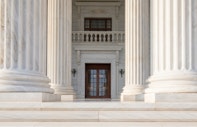What Bahá’ís Believe
Essential Relationships
The Bahá’í Administrative Order
The Institution
of the Counsellors
- What Bahá’ís Believe
- Overview
- Bahá’u’lláh and His Covenant
- The Life of the Spirit
- God and His Creation
- Essential Relationships
- Universal Peace
- What Bahá’ís Do
The institution of the Counsellors was established by the Universal House of Justice in 1968. Its members, who have no legislative, executive, or judicial authority, encourage action, foster individual initiative, and promote learning within the Bahá’í community as a whole, this in addition to offering advice to Spiritual Assemblies. The institution plays a vital role in advancing the interests of the Bahá’í Faith, exerting influence on the life of the Bahá’í community, from the grassroots to the international level.
Every five years, the Universal House of Justice appoints a total of 90 Counsellors around the world, who organise their work through five Continental Boards. These Boards, in turn, appoint Auxiliary Board members to serve specific geographical areas and territories within the continental region. The Counsellors, together with the members of the Auxiliary Boards and their assistants, work to stimulate the growth and vibrancy of the Bahá’í community, promoting the development of its spiritual, intellectual, and social life.
The members of the institution of the Counsellors are concerned with enhancing the capacity of the Bahá’í community to devise systematic plans of action, to execute them energetically, and to learn from experience in efforts to contribute to building the world civilization envisaged by Bahá’u’lláh. They nourish love and certitude in the hearts of the Bahá’ís, fortify bonds of friendship and unity, promote principles and ethical standards enshrined in the Bahá’í teachings, and raise the vision of community members that they may dedicate their energies to the welfare of the human race.
The work of the Continental Boards of Counsellors is guided by the International Teaching Centre, the Seat of which is located at the Bahá’í World Centre. The functioning of the International Teaching Centre itself is largely corporate in character. It remains fully informed of the progress of the Bahá’í community in all parts of the world and alert to possibilities for its growth, the consolidation of its institutions, and the advancement of its collective endeavours. In this connection, it pays particular attention to the development of human resources, helping the worldwide Bahá’í community to increase its capacity to endow growing numbers of people with the spiritual insights, knowledge, skills, and abilities required to serve humanity effectively. The nine members of the International Teaching Centre are appointed by the Universal House of Justice for a five-year term, immediately following the International Bahá’í Convention.
In the interplay between the work of Spiritual Assemblies and that of the Counsellors, the Administrative Order concentrates authority in the hands of elected bodies. Yet, it does not deprive the system of the wisdom and experience of certain appointed individuals. Indeed, it recognizes and affirms that the Counsellors and their auxiliaries—in addition to promoting adherence to principle on the part of individual Bahá’ís, Bahá’í institutions, and Bahá’í communities—are especially qualified to advise Spiritual Assemblies on their endeavours.
The bedrock on which this Administrative Order is founded is God’s immutable Purpose for mankind in this day. The Source from which it derives its inspiration is no one less than Bahá’u’lláh Himself.







